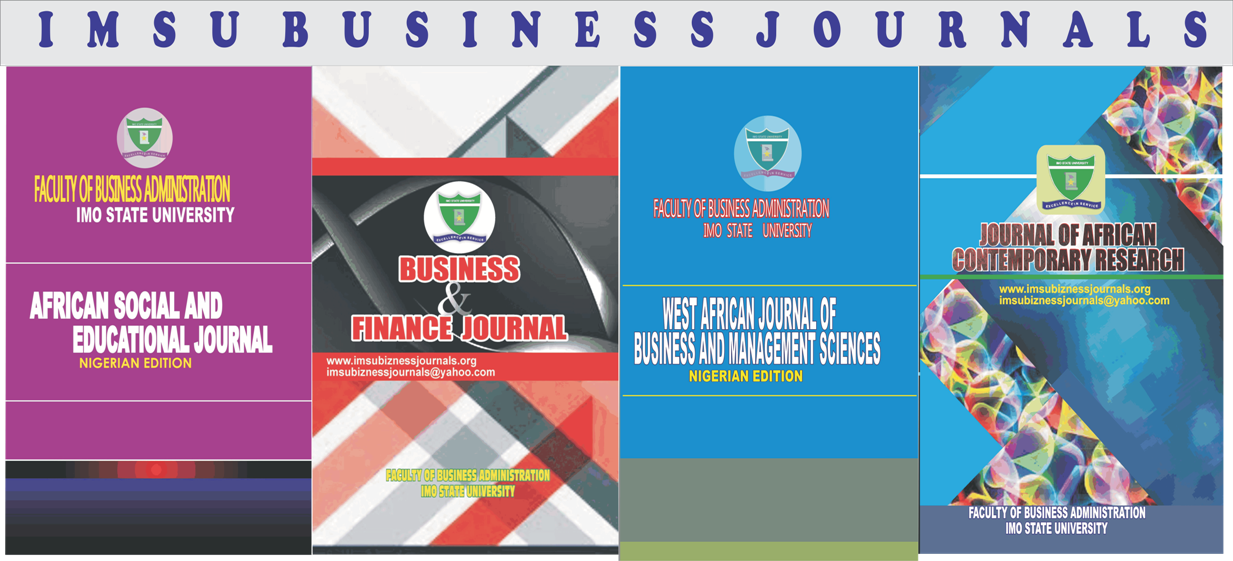2021 Archive
| 1 |
Title: DETERMINANTS OF MARKET VALUES OF QUOTED BANKING INSTITUTIONS PANEL DATA EVIDENCE FROM NIGERIA AND SOUTH AFRICA.pdf Author: AKOBUNDU, CHARLES ECHEWODO., E. J. OKEREKE PhD. AND P. C. NWAKANMA PhD. Abstract: Abstract The study evaluated key factors affecting the market values of quoted banks in Nigeria and South Africa. The panel data were derived from the 2010-2019 financial statements of the banks of the two African countries. Banking institutions market values were modeled on debt-equity, company size, dividends policy, profitability, money supply, inflation rates, gross domestic products and exchange rates. Panel data methodology was used while the fixed-effects model was used as the 5 percent meaning estimation technique. Fixed effects, random effects and pooled estimates have been tested during the Hausman test. Roots of the panel unit and cointegration analysis of the panel were performed in the study. From Nigeria, the study found that the internal and external variables account for 81.5 and 82.9 percent of total variations in the market values. Corporate size, equity returns, Earnings per share and the payout ratio have a positive effect while Nigerian banks quoted equity ratio has a negative impact on the market values. The result showed that money supply had a negative impact on market values of Nigerian banking entities while inflation, gross domestic product and exchange rates had a positive impact. in the South African study, both internal and external variables account for 49.1 and 61.1 per cent of the total variations in market values. Equity and corporate size returns have a negative effect, whereas earnings per share, dividend policy and debt-equity ratio have a positive impact on the quoted South African banks. The macro-variables show that the money supply and gross domestic products have a negative effect, while inflation rate and exchange rates have a positive impact on South Africas quoted banking institutions market values. The study concluded that the variables in Nigeria have higher explanatory powers than South Africa. Based on the results the management of banking institutions should improve management strategies to manage the uncertainties that affect their market values in the operating environment. Keywords: Market Value, Quoted Banking Institutions, Panel Data Evidence, Nigeria, South Africa View |
| 2 |
Title: ENVIRONMENTAL ACCOUNTING PRACTICES AND FIRM VALUE OF QUOTED MANUFACTURING COMPANIES IN NIGERIA.pdf Author: ADEGBIE F.F., EKPENI K. AND OWOLABI B.A Abstract: Abstract This study examined the effect of environmental accounting practices on firm value of quoted manufacturing companies in Nigeria. The study adopted ex-post facto research design and considered a population of 34 manufacturing firms listed on Nigerian Stock Exchange as at 31st December, 2019. The study selected a sample size of 11 companies (that is, 9 consumer goods companies and 2 industrial goods companies) with the used of purposive sampling technique. Descriptive and inferential statistics were carried out. The result of pooled OLS was most appropriate to estimate the model and the result reveals that environmental accounting practices with the control effect of company size has significant effect on firm value of manufacturing companies in Nigeria. The study recommends that quoted manufacturing firms should intensify efforts in compliant with requirements of Global Reporting Initiatives (GRI) for environmental accounting practices. Keywords: Environmental accounting practices, firm value, manufacturing companies. View |
| 3 |
Title: FINANCIAL DEVELOPMENT AND AGRICULTURAL SECTOR PERFORMANCE EVIDENCE FROM SUB-SAHARAN AFRICAN ECONOMIES.pdf Author: KEREMAH, SYDNEY CLEVER., OKEREKE, EMEKA JUDE PhD. AND NNAMDI, IKECHUKWU SAMUEL Abstract: Abstract Propelled by the need to promote diversification exercise of the African nations amidst limited financial resources, the study evaluates the effects of Financial Development on agricultural sector performance in Sub-Saharan African Countries over the period 1994 - 2019. Secondary data were sourced from the World Bank Report. Financial Development is captured using indicators such as financial inter-relation ratio, Finance ratio, ratio of money to national income, financial accessibility ratio, and net-interest margin, while the sectoral contribution of the agricultural sector to gross domestic product in Nigeria constituted the measure of the sector’s performance. This study employed the Panel Stationarity Test, Panel ARDL/Bounds Test and the error correction model in evaluating the nature of the prevailing relationship between the underlying variables. The result revealed that the ratio of money to national income, financial accessibility ratio and net interest margin are viable predictors of the performance of the agricultural sector in the sampled 45 Sub Saharan African countries, while financial Inter-relation ratio and finance ratio display adverse influence on agricultural sector performance in the sample countries. In light of this, it is recommended that financial institutions should endeavor to mobilize credits at favorable rates to local farmers. This credits should be given with a reasonable tenure such as two to five years. Operations of financial institutions must be properly management to avoid lopsided disbursement to other sectors at the detriment of the agricultural sector. Keywords: Financial Development, Agriculture, Sub-Saharan African Countries, Financial Depth. View |
| 4 |
Title: CONSUMER PERCEPTION ON PERFORMANCE OF SUPERMARKET IN PORT HARCOURT (SURVEY OF SELECTED SUPERMARKETS.pdf Author: ANUONYEH ANSELEM, MNIM, MCAI Abstract: Abstract This study focuses on perception of consumers on performance of supermarkets in Port Harcourt. The study is positioned to examine the relevance of perception on consumers in promoting the performance profitability of supermarkets, and consumer’s satisfaction. The study used structured questionnaire technique for four supermarkets as a means of data collection. The sample of 240 was selected using convenience sample procedure for easy accessibility and coverage of the consumers. A detailed questionnaire of 246 were prepared and distributed to a sampled target in order to obtain used data from the selected consumers in Port Harcourt. The data were collected and analysed using sample percentages statistical technique while the hypotheses were tested using T. Test method. Based on the findings, it was recommends as follows: (1) Owners of supermarket in Port Harcourt should endeavor to have sufficient arrangements for security to secure their business environment thereby enhancing and encouraging consumer’s satisfaction. (2) Employees of retailer operatives should wear a cheerful look and have a sense of courtesy that will ease customers to take a repeat purchase. Price of goods should not be too high but moderate knowing that consumers are price sensitive while shopping. (3) The concept of consumer perception should be adopted manufacturing fruits in Port Harcourt in their annual gadgets to enhance quality goods.(4) Supermarket owners should be sincere in their daily operations. Consumers should be able to brief them. They should be honest in bringing the original products with moderate/affordable prices. View |
| 5 |
Title: TRADE OPENESS, FINANCIAL OPENESS AND FINANCIAL DEVELOPMENT EVIDENCE FROM SUB SECTOR.pdf Author: WELI, CHISONMA I., OKEREKE E.J. PhD. AND IFIONU, E.P Abstract: ABSTRACT Financial development has been propounded by theories and found by studies to be a major tool necessary for economic growth and development; hence there have been investigation on factors that may influence it. This study was carried out with the objective of analyzing one of such factors suggested in literature- economic openness. The study considered its general effect on financial development, and its sectoral influence if any. Data from 1981 to 2017 sourced from the World Bank indicators on Nigeria and Central Bank of Nigeria Statistical Bulletin were considered. The study analysed the relationship between financial development (general outlook- credit to private sector as percentage of Gross Domestic Prodict- GDP; and sectoral outlook- growth rate of credit to agriculture and forestry sector) and openness (trade openness- import and export to GDP, and financial openness- foreign direct investment to GDP). The study using measures under the classical linear regression analysis found that in the short and long run, financial development generally and by sector effort did not have any significant relationship with either forms of openness in Nigeria. Financial openness had a negative sign though, but it was insignificant. The long run test only revealed possibility of a long run relationship between openness and financial development through its sectoral effect. The Granger causality test also revealed no form of causal relationship existed between these variables considered within the period under study generally or by sector. The results also showed a weak form of causal relationship flowing from financial openness to trade openness. The study concluded that economic openness so far did not have a significant relationship with financial development in Nigeria, perhaps as a result of the absence of a well-developed institutional and regulatory framework. Also like several other developing countries, Nigeria constantly seeks to attract foreign investment to raise funds necessary to meet its capital intensive imports which it believes should jumpstart economic development. This activity can be inimical to its domestic financial development or independent as the case may be. The study recommended the introduction of policies which would encourage domestic financial institutions to take deliberate steps to influence and assist export driven initiatives, and support local producers. View |
| 6 |
Title: CORPORATE BOARD DIVERSITY AND STOCK PRICE PERFORMANCE OF QUOTED NIGERIAN FIRMS.pdf Author: UDOH, A., OKEREKE E.J. PhD. AND IFIONU, E.P Abstract: Abstract This study investigates the relationship between corporate governance diversity on stock prices of quoted firms in Nigeria within the panel data framework using both fixed effects and random effects methods. The data are annually at firm level for 2008 and 2018 and the sample includes 20 selected firms (10 banks, 5 food and beverages companies, two building and construction companies and 3 services companies). The results show that firm-specific characteristics such as organization’s size, management culture and policy play significant roles in the relationship between corporate governance diversity and stock prices in Nigeria. There is evidence that gender diversity, nationality diversity and board size are not significantly related to stock prices in Nigeria. These results hold controlling for firm size. Therefore, we argue that ignoring firm-specific effects while estimating the firm value would lead to biased results. As such, the study recommended that high quality financial disclosure coupled with total transparency, remarkable accountability and avoidance of insider abuses would be essential complement to sound corporate governance. View |
| 7 |
Title: FINANCIAL DEVELOPMENT AND AGRICULTURAL SECTOR PERFORMANCE EVIDENCE FROM SUB-SAHARAN AFRICAN ECONOMIES.pdf Author: KEREMAH, SYDNEY CLEVER., OKEREKE, EMEKA JUDE AND NNAMDI, IKECHUKWU SAMUEL Abstract: Abstract This study is motivated by the reported shallowness of the Nigerian financial sector and poor emphasis on manufacturing and industrial activities in sub-Saharan countries. In light of this, the study evaluates the influence of financial development on manufactural sector performance in Sub-Saharan African Countries from 1994 to 2019. The study employed secondary panel data which was extracted from the annual report of the World Bank. The stationarity test, Autoregressive Lag Distribution, bound test, and Error Correction are employed. To capture financial development, the study employed the five indicators; financial inter-relation ratio, Finance ratio, the ratio of money to national income, financial accessibility ratio, and net interest margin. It is seen in the long run that, only financial inter-relation ratio, finance ratio, and financial accessibility ratio show valuable influence on the performance of the manufacturing sector, while a negative and invaluable relationship can be linked to the ratio of money to national income and net-interest margin that failed to sufficiently predict the performance of the manufacturing sector. The study recommends that financial institutions regulators in SSA should reduce the interest charges to encourage financial inclusion and access to financial services. Also, Minimum rates paid on financial institutions deposits should be increased by a minimum of 7%, to stimulate depositors’ interest in the patronage of the financial services sector within the SSA countries. Keywords: Financial Development, Manufacturing Sector, Panel Analysis, Sub-Saharan African Countries. View |
| 8 |
Title: IMPACT CORPORATE SOCIAL RESPONSIBILITY DISCLOSURE ON FIRM PERFORMANCE EVIDENCE FROM THE FOOD AND BEVERAGES INDUSTRY.pdf Author: KELECHI-NNAJI, NJIDEKA NNENNA AND EBERE CHUKWUMA CHRISTOPHER Abstract: Abstract Motivated by the conflicting evidence reported by previous studies, this adopts the panel data design to investigate the effect of corporate social responsibility disclosure (CSRD) on firm financial performance in Nigeria. Four dimensions of CSRD (community, employees, government and shareholders) are examined. The data analysis is based on an unbalanced panel data obtained from 10 listed companies in the Nigerian food and beverages industry spanning 2013 to 2019. All data were collected from annual reports of the individual firms and were analyzed in EViews 11 software package. The performance of the two panel estimation methods was compared using the Hausman test. Our results showed that random effect estimation method gives the most acceptable results, which implies that while management philosophy plays no significant role in the relationship between CSR disclosure and financial performance, measured by return on assets. Our results also show that both employees’ responsibility disclosure and shareholders’ responsibility disclosure are significant determinants of firm financial performance. Based on these findings, we recommend that corporate managers in the food and beverages sector can improve the firm’s financial performance by focusing more on CSR activities relating to employees’ welfare and shareholders wealth. This can be achieved by reducing the contributions to post-employment welfare of the current employees as well as increasing the amount dividend paid to shareholders. Key words: CSR disclosure, firm financial performance, management philosophy, panel data View |
| 9 |
Title: CORPORATE CHARACTERISTICS AND MARKET VALUES OF QUOTED BANKING INSTITUTIONS A GENERALIZED LEAST SQUARE APPROACH FROM NIGERIA AND KENYA.pdf Author: AKOBUNDU, CHARLES ECHEWODO., E. J. OKEREKE PhD. AND P. C. NWAKANMA PhD. Abstract: Abstract In a bid to further predict firms’ values across various industries, the study examined corporate characteristics and their implication on the market values of quoted banking institutions in the Nigerian and Kenyan economies. The panel data were derived from the 2010-2019 financial statements of the banks of the two African countries. Banks market values were modeled on debt-equity, company size, dividend policy, earnings per share, profitability. Panel data methodology was used while the fixed-effects model was used as the 5 percent meaning estimation technique. Fixed effects, random effects, and pooled estimates have been tested during the Hausman test. Roots of the panel unit and cointegration analysis of the panel were performed in the study. The study found from Nigeria that 81.5% of total changes in market values are due to the corporate characteristics as defined in the regression model. Corporate size, equity returns, earnings per share, and the payout ratio have a positive effect while Nigerian banks quoted equity ratio harms the market values. Kenya accounts for 96.7% of the total changes in the market values, according to corporate characteristics as defined in the regression model. That corporate size and Return on equity have adverse consequences, while Kenyan banks quoted dividend policy, debt-equity, and Earnings per share have a positive effect. The study concludes that corporate characteristics have a higher impact on Kenyan commercial banks market values than Nigerian banks. We recommend that banks in Nigeria and Kenya adopt appropriate management of their debts and capital structures and that banks in Nigeria and Kenya take over a reasonable amount of asset to ensure the efficient and effective management of their banks which will increase corporate values. Keywords: Corporate Characteristics, Market Value, Quoted Banking Institutions, Nigeria, Kenya. View |
| 10 |
Title: CORRELATION-SHIP BETWEEN DIVERSIFIED GROWTH STRATEGY AND CORPORATE ROBUSTNESS AMONGST DEPOSIT MONEY BANKS IN PORT HARCOURT.pdf Author: GREEN SOPRINYE DUBLIN AND EKETU, C. PhD Abstract: Abstract This research work examines correlation-ship between diversified growth strategy and corporate robustness amongst deposit money banks in Port Harcourt. The study was conducted at the group macro-level of analysis and group unit of analysis, and drew its research data from a population of 49 departments drawn from 8 money deposit banks in Port Harcourt. The major data collection instrument was questionnaire supported with scheduled interviews. The data collected were analysed using Descriptive (Univariate) and inferentially (Bivariate and Multivariate). Inferentially, the research hypotheses were tested using Spearman’s Rank Order Correlations Coefficient. Drawings from the test results and discussions, the study found that such growth strategies as Concentric, Integrative and Diversifications, directly increase the sustenance of corporate banks robustness and agility. Thus, the study concluded that corporate resilience of money deposit banks is a function of the effective implementation of growth strategies. The study therefore recommended that banks should maintain constant growth consciousness to sustain their desired resilience. View |
| 11 |
Title: CORPORATE OWNERSHIP STRUCTURE AND DIVIDEND POLICY THE ROLE OF BOARD GENDER DIVERSITY.pdf Author: EDEH LAWRENCE PhD., OGBOI EMEKE AND OGBONNA MARTIN Abstract: Abstract This study examines the moderating effect of board gender diversity on the relationship between ownership structure and dividend policy of manufacturing firms in Nigeria for the period 2010 to 2018. To this end the study employed ownership structure as independent variables proxied as ownership concentration and foreign ownership together regressed on the dependent variable of dividend policy whose proxy in this study is dividend yield. Ex-post factor research design was employed in the study methodology and Moderated Regression Analyses technique was relied upon to estimate the panel data set which revealed that board gender diversity significantly moderates the relationship between ownership structure and dividend policy. This result implies that a more gender diverse board contributes to declining dividend yield in a situation where the firms’ ownership structure is highly concentrated. This finding is seen to be inconsistent with the agency theory which supports the inclusion of more female directors in a bid to douse tension arising from principal agent relationship. From the foregoing, we urge managers to apply caution when admitting more female representatives into corporate boards in a situation where ownership structure of the firm is highly concentrated. This policy when applied will help douse its negative contribution towards dividend yield of listed manufacturing firms in Nigeria. Keywords: Ownership Structure Dividend Policy Moderated Regression Analyses Manufacturing Firms. View |
| 12 |
Title: THE EFFECT OF DEFERRED TAX ON THE PERFORMANCE OF QUOTED BANKS IN NIGERIA.pdf Author: AKAN DAVID C. PhD., ALOAMAKA JUDITH .I AND DOKAI-OKONKWO N. CHRISTABEL Abstract: Abstract The study of deferred tax and corporate performance is not a new one. IAS 12 has been in existence since 1996 and since then accountants and tax experts have been studying the phenomena intending to ascertain how it can be used to influence the performance of corporate bodies. Most of the study, however, did not focus on the Nigerian Banking system; and the few that studied the banking industry did not diagnose their data which could result in a spurious result. This study, therefore, evaluated the effect of deferred tax on the performance of quoted banks in Nigeria. Three sampled banks were judgmentally selected. Augmented dickey fuller unit root test was applied to know whether the data were stationary and were detrended where necessary. The variables that proxied performance was EPS, Cash flow, PAT, and Total Assets. The outcome from the basic regression revealed that deferred tax doesnt impact significantly the performance of banks in Nigeria. The examination along these lines suggests that organizations ought to keep away from so much as could be expected, varying taxation rate into a future that isnt sure. Keywords: Deferred Tax, Earnings per Share, Profit after Tax, Cash flow, Total Asset, Banks Performance View |
| 13 |
Title: CUSTOMER RETENTION STRATEGIES AND POST-COMPLAINT BEHAVIOUR OF GSM SUBSCRIBERS IN RIVERS STATE.pdf Author: OKO, WILLIAMSON KUE AND KALU, SYLVA EZEMA Abstract: Abstract This study examined the relationship between customer retention strategies and post-complaint behaviour of GSM subscribers in Rivers State. A sample size of one hundred and forty (140) subscribers of MTN, Globacom, Airtel and 9mobile were evenly selected for the study using jugmental sampling method. 140 copies of questionnaires were distributed to respondents and all returned usable. Hypotheses were tested using spearman ranked correlation coefficient with the aid of statistical package for social science (SPSS) version 23. The study finding reveals that there is a positive and significant relationship between assurance, responsiveness, and apology and post compliant behaviour. The study concluded that GSM service providers’ subscribers are more satisfied with responsiveness, seconded by assurance and lastly, apology. The study recommended among others that GSM service providers should invest more on responsiveness to earn repeat purchase and encourage brand advocates and anticipate subscribers’ complaints and design post-complaint satisfaction antidote. Key Words: Assurance, responsiveness, apology and post-compliant behaviour. View |





